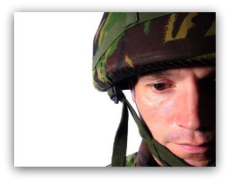
The shootings at the Ft. Hood, Texas army base in November 2009, allegedly by Army Maj. Nidal Hassan, combined with the requested surge of 30,000 troops to Afghanistan by President Barak Obama the following month, has focused attention on the urgent need for more mental health specialists in the Army.
Three of the 13 casualties from the Ft. Hood tragedy were from the 467th Army Reserve combat-stress-control detachment (mental health workers) at the base’s processing center preparing for deployment. The 1908th combat-stress-detachment also lost two soldiers during the shooting.
Increased Hiring of Military Health Specialists
Ironically, the focus of both of these mental health units is to treat troubled soldiers in combat zones. Both of these specialized units include mental health specialists, professionals in short supply, but those who the Army recognizes as critical to the overall success of President Obama’s mission in Afghanistan. Low troop morale and emotional and behavioral issues are two of the Army’s greatest barriers to winning the war.
Lt. Gen. Eric B. Schoomaker, the Army’s surgeon general, said that the Army is short by about 25% of its overall goal for hiring more behavioral health specialists – another title for mental health specialists. He said the Army plans to fill that shortfall as soon as possible, hoping to send one specialist for every 700 soldiers in Afghanistan.
What do Military Health Specialists Do?
Increasing the number of these specialists is part of the Army’s plan to more aggressively identify and treat stressed Army personnel, many who have been deployed several times over the past eight years, and are experiencing emotional issues, marital problems, and depression. A mental health report released by the Army in November 2009 stated that about 30% of soldiers met the criteria for having psychological problems, compared with about 14% on the first deployment, and 18% on the second deployment. And usage rates for behavioral health medications including those for combat stress and sleep “increased significantly by the third deployment,” the report showed.
Suicide prevention is another key behavioral health concern that the Army hopes to address with more mental health specialists. From January through October 2009, there were 133 reported active-duty Army suicides compared with 115 for the same period in 2008, according to data released by the Army.
Mental health specialists deliver suicide prevention programs, and interventions for those considered at-risk. They work under the supervision of Army psychologists, psychiatrists, social workers and psychiatric nurses. When deployed to combat zones, they work with soldiers on stress reduction techniques. The terrain and rugged landscape in Afghanistan often makes it difficult for soldiers to receive mental health care because they are out in small outposts as part of the counterinsurgency effort. That means that mental health specialists often travel over difficult terrain to reach soldiers.
These specialists also work in fixed military facilities, on bases, military hospitals and clinics in the U.S. and overseas, conducting interviews with service members to collect psychosocial data, or administer and score intellectual and personality tests. They also are trained to determine if a service member has suffered organic brain damage.
Other Army assignments for mental health specialists include drug and substance abuse programs, correctional facilities, inpatient psychiatric wards, and medical clinics. A typical assignment is assisting patients to meals, appointments, and or recreational activities. The degree of responsibility for these Army specialists depends on experience and education.
Training Requirements for Military Mental Health Specialists
The Army provides excellent training for mental health specialists, and once these professionals are ready to transition to civilian life, many job opportunities are available. Caseworkers and psychiatric aides are two positions for civilian mental health specialists in addition to a variety of jobs in hospitals, clinics, nursing homes and rehabilitation centers.
If you are interested in assessing and evaluating soldiers, providing assistance when they appear stressed or anxious, administering psychological tests, and assisting those recovering from war wounds and disabilities, you should consider a career as an Army mental health specialist. Experience in this field can lead to careers in counseling, therapy, or other psychology related positions. Request information from psychology or counseling schools to learn more.